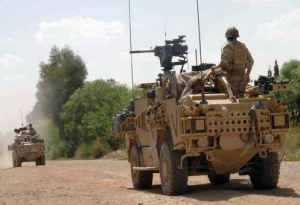Articles >>
Jackal keeps proving its worth in Afghanistan
Category: Army

When purchase of the latest batch of Jackal vehicles was announced at Defence Equipment & Support's Defence Vehicle Dynamics event in June 2010 it took the number of Jackal vehicles procured for UK forces to more than 500. The announcement, by Defence Equipment, Support and Technology Minister Peter Luff, to procure another 140 of the 2A version of the weapons-mounted patrol vehicle at a cost of £45m was another vote of confidence in a vehicle which has enabled British patrols to keep in touch with the enemy, often in the toughest of Afghan terrain. Around 40 of the Jackal 2As are due to be delivered this month. Jackal is the best known of the high mobility transporter vehicles delivered by Babcock over the last few years. The original contract to produce the vehicles was signed as an Urgent Operational Requirement in 2007. The contract has since delivered with huge success. Jackal vehicles are produced by Babcock under an alliance with Supacat, the prime contractor and design authority. Supacat is responsible for design, development, prototyping, integration and programme management, while Babcock takes responsibility for detailed production planning, purchasing and manufacture at its Devonport factory. Perfect partnership has been the key for the project co-ordinators at Defence Equipment & Support (DE&S). Alan Stephen, DE&S' high mobility transport vehicle project manager, said: "The success of the Jackal programme has been grounded on a combined effort between the project team and industry, who have shown great will to achieve and the ability to take risk to continue delivery. "My team is thoroughly committed to achieving the best solution for the soldier on the ground, as early as possible, as economically as possible. |

"We can't rest on our laurels though, and are continually examining ways of making an excellent vehicle even better. Regular good communications direct with theatre and excellent backbriefs from returning brigades assist in identifying where we should be looking at improvements. "Of course it does help motivation that it's a very well-liked vehicle which has delivered an important capability to Operation HERRICK." The vehicles are built by a team of up to 130 Babcock employees working on the Devonport pulse production line, along with a smaller project management team of 25. The pulse production line involves dividing the total manufacturing activity into a series of 12 equally balanced packages or 'cells', and the vehicle is physically moved, or 'pulsed', from one area assembly to the next on a daily basis. Application of a 'lean' philosophy has identified and eliminated any non-value-adding activities, and serves to ensure that the demanding delivery schedules and critical quality and reliability requirements are met. This is coupled with highly effective supply chain management to reduce lead times, ensure quality and reliability, manage obsolescence, and ultimately drive down the cost of construction and ownership. Production runs at a rate of one vehicle a day. Babcock Land Systems Director, Chris Dunn, said: "The Jackal vehicle has been a resounding success, having proved its versatility; combining speed and manoeuvrability with unparalleled cross-country performance over Afghanistan's harsh terrain. |

"We are delighted to be working in alliance with Supacat to deliver these vehicles reliably and consistently within the shortest possible timescales. "Further, we have established Babcock as a company that can be relied upon to deliver vehicles of exceptional quality at record pace and, being OEM [Original Equipment Manufacture] independent, we are also talking to other vehicle designers about building their vehicles for upcoming programmes in the UK and abroad." Jackal - the story so far...
|
UK MoD |
The Dutch armed forces select Rheinmetall to modernize their Bergepanzer 3 Büffel
17.05.2019
Rheinmetall Mission Master Dominates European Ground Robotic Systems Competition at ELROB 2018
04.11.2018
Mastiff PPV (Mine protected carrier)
HMT 400 Jackal (Patrol Vehicle)
Jackal (Robot, Unmanned Vehicle)
Discuss
